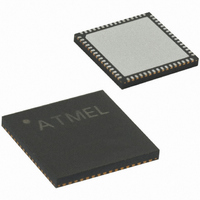ATMEGA128RFA1-ZU Atmel, ATMEGA128RFA1-ZU Datasheet - Page 193

ATMEGA128RFA1-ZU
Manufacturer Part Number
ATMEGA128RFA1-ZU
Description
IC AVR MCU 2.4GHZ XCEIVER 64QFN
Manufacturer
Atmel
Series
ATMEGAr
Datasheets
1.ATMEGA128-16AU.pdf
(385 pages)
2.ATAVR128RFA1-EK1.pdf
(13 pages)
3.ATAVR128RFA1-EK1.pdf
(555 pages)
4.ATMEGA128RFA1-ZU.pdf
(524 pages)
Specifications of ATMEGA128RFA1-ZU
Frequency
2.4GHz
Data Rate - Maximum
2Mbps
Modulation Or Protocol
802.15.4 Zigbee
Applications
General Purpose
Power - Output
3.5dBm
Sensitivity
-100dBm
Voltage - Supply
1.8 V ~ 3.6 V
Current - Receiving
12.5mA
Current - Transmitting
14.5mA
Data Interface
PCB, Surface Mount
Memory Size
128kB Flash, 4kB EEPROM, 16kB RAM
Antenna Connector
PCB, Surface Mount
Operating Temperature
-40°C ~ 85°C
Package / Case
64-VFQFN, Exposed Pad
Rf Ic Case Style
QFN
No. Of Pins
64
Supply Voltage Range
1.8V To 3.6V
Operating Temperature Range
-40°C To +85°C
Svhc
No SVHC (15-Dec-2010)
Rohs Compliant
Yes
Processor Series
ATMEGA128x
Core
AVR8
Data Bus Width
8 bit
Program Memory Type
Flash
Program Memory Size
128 KB
Data Ram Size
16 KB
Interface Type
JTAG
Maximum Clock Frequency
16 MHz
Number Of Programmable I/os
38
Number Of Timers
6
Operating Supply Voltage
1.8 V to 3.6 V
Maximum Operating Temperature
+ 85 C
Mounting Style
SMD/SMT
3rd Party Development Tools
EWAVR, EWAVR-BL
Development Tools By Supplier
ATAVR128RFA1-EK1
Lead Free Status / RoHS Status
Lead free / RoHS Compliant
Available stocks
Company
Part Number
Manufacturer
Quantity
Price
Part Number:
ATMEGA128RFA1-ZU
Manufacturer:
ATMEL/爱特梅尔
Quantity:
20 000
Company:
Part Number:
ATMEGA128RFA1-ZUR
Manufacturer:
ON
Quantity:
56 000
- ATMEGA128-16AU PDF datasheet
- ATAVR128RFA1-EK1 PDF datasheet #2
- ATAVR128RFA1-EK1 PDF datasheet #3
- ATMEGA128RFA1-ZU PDF datasheet #4
- Current page: 193 of 555
- Download datasheet (6Mb)
14.3.1 Alternate Functions of Port B
8266B-MCU Wireless-03/11
Note:
The following table summarizes the function of the overriding signals. The pin and port
indexes from
overriding signals are generated internally in the modules having the alternate function.
Table 14-2. Generic Description of Overriding Signals for Alternate Functions
Signal Name
The following subsections shortly describe the alternate functions for each port, and
relate the overriding signals to the alternate function. Refer to the alternate function
description for further details.
The Port B pins with alternate functions are shown in the following table.
PUOE
PUOV
DDOE
DDOV
PVOE
PVOV
PTOE
DIEOE
DIEOV
DI
AIO
1. WRx, WPx, WDx, RRx, RPx, and RDx are common to all pins within the same port.
clk
each pin.
Figure 14-5 on
I/O
Full Name
Pull-up Override
Enable
Pull-up Override
Value
Data Direction
Override Enable
Data Direction
Override Value
Port Value Override
Enable
Port Value Override
Value
Port Toggle Override
Enable
Digital Input Enable
Override Enable
Digital Input Enable
Override Value
Digital Input
Analog Input/Output
, SLEEP, and PUD are common to all ports. All other signals are unique for
page 192 are not shown in the succeeding tables. The
Description
If this signal is set, the pull-up enable is controlled by
the PUOV signal. If this signal is cleared, the pull-up is
enabled when {DDxn, PORTxn, PUD} = 0b010.
If PUOE is set, the pull-up is enabled/disabled when
PUOV is set/cleared, regardless of the setting of the
DDxn, PORTxn, and PUD Register bits.
If this signal is set, the Output Driver Enable is
controlled by the DDOV signal. If this signal is cleared,
the Output driver is enabled by the DDxn Register bit.
If DDOE is set, the Output Driver is enabled/disabled
when DDOV is set/cleared, regardless of the setting of
the DDxn Register bit.
If this signal is set and the Output Driver is enabled, the
port value is controlled by the PVOV signal. If PVOE is
cleared, and the Output Driver is enabled, the port
Value is controlled by the PORTxn Register bit.
If PVOE is set, the port value is set to PVOV,
regardless of the setting of the PORTxn Register bit.
If PTOE is set, the PORTxn Register bit is inverted.
If this bit is set, the Digital Input Enable is controlled by
the DIEOV signal. If this signal is cleared, the Digital
Input Enable is determined by MCU state (Normal
mode, sleep mode).
If DIEOE is set, the Digital Input is enabled/disabled
when DIEOV is set/cleared, regardless of the MCU
state (Normal mode, sleep mode).
This is the Digital Input to alternate functions. In the
figure, the signal is connected to the output of the
Schmitt-Trigger but before the synchronizer. Unless the
Digital Input is used as a clock source, the module with
the alternate function will use its own synchronizer.
This is the Analog Input/output to/from alternate
functions. The signal is connected directly to the pad,
and can be used bi-directionally.
ATmega128RFA1
193
Related parts for ATMEGA128RFA1-ZU
Image
Part Number
Description
Manufacturer
Datasheet
Request
R

Part Number:
Description:
Manufacturer:
ATMEL Corporation
Datasheet:

Part Number:
Description:
Microcontroller with 128K bytes In-system programmable flash, 8 MHz, power supply =2.7 - 5.5V
Manufacturer:
ATMEL Corporation
Datasheet:

Part Number:
Description:
IC AVR MCU 128K 16MHZ 5V 64TQFP
Manufacturer:
Atmel
Datasheet:

Part Number:
Description:
IC AVR MCU 128K 16MHZ 5V 64-QFN
Manufacturer:
Atmel
Datasheet:

Part Number:
Description:
IC AVR MCU 128K 16MHZ COM 64-QFN
Manufacturer:
Atmel
Datasheet:

Part Number:
Description:
IC AVR MCU 128K 16MHZ 64-TQFP
Manufacturer:
Atmel
Datasheet:

Part Number:
Description:
IC AVR MCU 128K 16MHZ 64-TQFP
Manufacturer:
Atmel
Datasheet:

Part Number:
Description:
IC AVR MCU 128K 16MHZ IND 64-QFN
Manufacturer:
Atmel
Datasheet:

Part Number:
Description:
MCU AVR 128KB FLASH 16MHZ 64TQFP
Manufacturer:
Atmel
Datasheet:

Part Number:
Description:
MCU AVR 128KB FLASH 16MHZ 64QFN
Manufacturer:
Atmel
Datasheet:

Part Number:
Description:
MCU AVR 128KB FLASH 16MHZ 64TQFP
Manufacturer:
Atmel
Datasheet:











